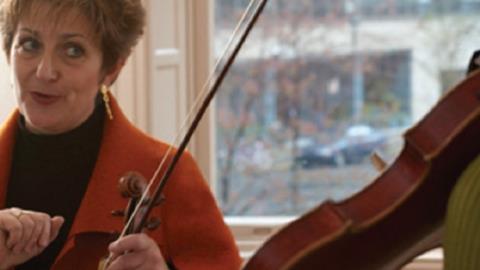First impressions can set the tone for your relationship with a fresh student, so be aware of their anxieties, acknowledge their skills and harness their enthusiasm, says Royal Northern College of Music senior lecturer in music education Philippa Bunting

A small child shifts nervously from foot to foot on the top step as the bell finishes its rather lengthy ringing. It seemed a long way from the pavement to the house, and they weren’t sure whether or not someone might be watching them from behind the curtains as they tripped slightly on the unfamiliar path, scuffing their shoe on one of the oldfashioned edging tiles. The moving figure inside looms slightly, distorted by the front door’s patterned glass as it approaches.
‘Oh dear,’ they think, as the sound of the lock opening adds yet another new sensation to this already unsettling experience. ‘Maybe learning the violin wasn’t such a great idea after all.’
Too late. The long-anticipated moment arrives. The door swings back and reveals – you. Their new teacher.
Not all of us meet our pupils for the first time on the front steps of our houses, but the principle is the same. New faces, places and experiences are exciting but can be potentially scary, particularly if your perspective is less than four feet from the ground. How we as teachers handle that all-important first meeting can drastically affect a child’s progress.
Just sometimes, in the headlong rush to get on with the learning, it is possible to neglect the niceties. To forget for a moment that yes, the violin is the primary focus of the activity, but at this crucial time it’s the whole person that matters.
All over the world, doors swing open at the start of the new teaching year. So what will your new pupil see when it’s yours? Someone flustered by a last-minute phone call, whisking away the last of the laundry and clutching a much-needed cup of coffee? Someone looking vaguely distracted, glancing at the clock as if to check whether it was a pupil or a parcel that was actually expected?
If the little child coming up the path is a complete beginner, they probably just want to get playing. Unencumbered by the knowledge that this is not a straightforward aspiration, they delightedly want to pick up their shiny new toy and make a noise. A wise teacher will seize on this and turn it into a musical game. We interrupt that first, joyous exploration at our peril.
If the child is not so little and already plays, and is simply changing teacher for whatever reason, they are probably full of the fear that they will not be good enough. That fear could quickly turn to scorn if you are not quick to recognise and acknowledge the skills that they already have. Letting them play uninterrupted gives you a chance to make your assessment, decide on a programme, and formulate some really strong praise for when they finish. Having a pile of music you think might be suitable for them is another convincing message that they truly were expected, and that they already have a place in your teaching studio.
If, on the other hand, our shoe-scuffer plays already but has had bad experiences with another teacher, chances are they’d rather be anywhere than walking up your front path right now. When teaching relationships break down, they rarely leave the pupil undamaged, and you are probably going to have to overcome a wealth of ‘I’m no good’ vibes. My advice: let them choose at least one piece of repertoire they really like, and find one thing that they can change immediately, with the result that it feels easier and sounds better.
Some teachers I know have the habit of taking any pupil who comes to them right back to basics. These are often the same teachers whose pupils, all beautifully schooled, look and sound almost exactly the same. Sometimes, of course, there are dire technical issues that require this kind of drastic surgery, but when a blanket approach affects even those who have been well taught, but perhaps brought up in a different technical school, I would question its validity. Violin pupils, like anyone else, are entitled to their dignity.
And what if that trembling newcomer is actually a mid-career professional adult, pursuing a dream with rekindled childhood skills? The self-esteem stakes are potentially even higher here, and a bid for control even less appropriate. Adult pupils are the worst for talking too much at the first meeting (and subsequent ones) but they also need a measure of soothing, and reassurance that their aspiration to learn is not laughable nor somehow unworthy. Unused to submitting themselves to someone else in a position of such relative vulnerability, they anxiously explain all the reasons why their performance won’t be up to scratch. We’re not therapists, but a gentle start and even some soft counselling can certainly ease the way.
First impressions can never be replaced, though their impact might lessen in the light of experience. I’m going to open that door now and smile.








































No comments yet